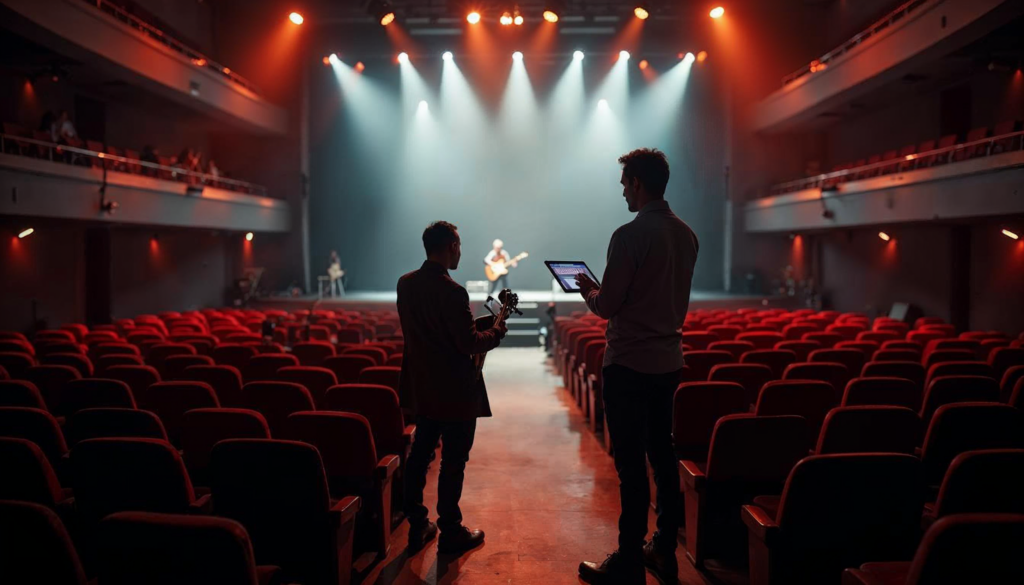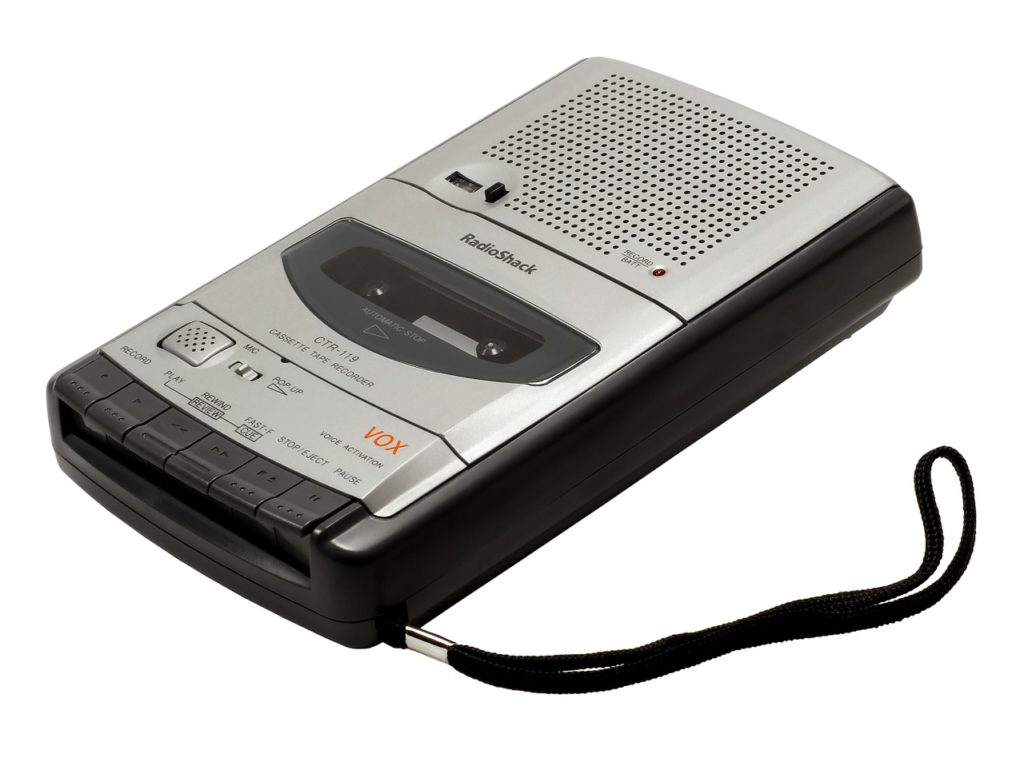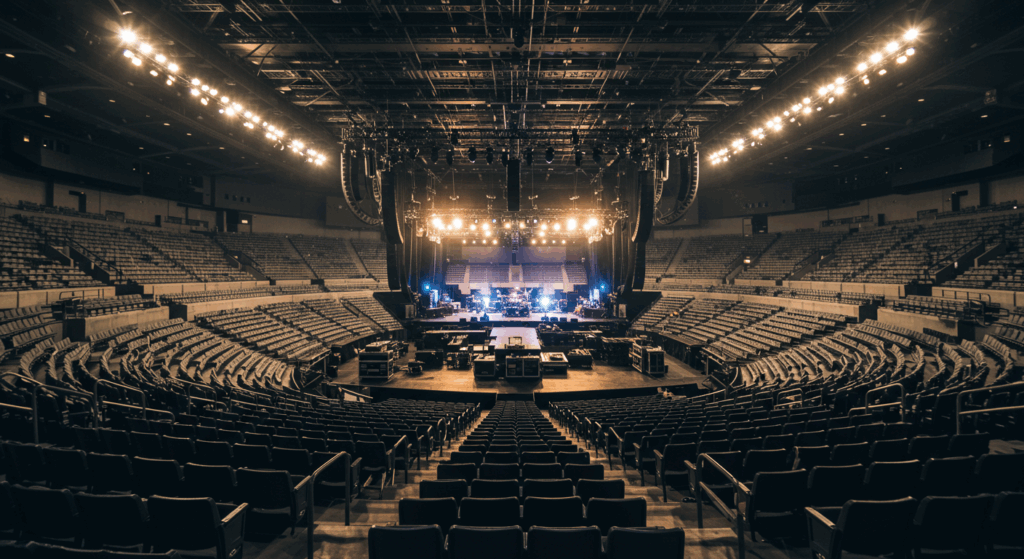
Concert Cost Breakdown: Where Promoters Are Spending
Concert tickets now average $75–$250 nationwide as production costs surge.
- Artists typically net only $8 profit from a $100 ticket after covering all touring expenses
- Venue rental costs now range from $50,000–$150,000 per night for major arenas
- Ticketing fees alone add substantial amounts to base ticket prices
- Co-promotion deals help share financial risks and increase booking opportunities
Smart promoters are turning to integrated management platforms to control rising costs and maximize profitability.
The sticker shock is real. The average concert ticket price reached nearly $136 for top-tier tours in 2024, with general concert tickets averaging $123. That’s a massive jump of 20% from the tickets we were griping about a few years ago.
But before you start ranting about greedy promoters, let’s dig into the real concert cost breakdown. Every dollar from that pricey ticket gets sliced and diced among dozens of people and expenses before anyone sees a profit. Understanding the complex event cost breakdown is essential for anyone working in live music, as managing this intricate web of costs requires serious organization and the right tools to stay profitable.
The days of $30 U2 tickets are long gone, and there’s a good reason why. Today’s concerts are full-scale productions that would make Broadway jealous, and the financial reality reflects that complexity.
What Does a Complete Concert Cost Breakdown Reveal About Your Ticket Money?
Ever wondered where your hard-earned cash actually ends up when you buy that $100 concert ticket? Recent analysis from the National Independent Talent Organization reveals the shocking reality: artists typically net just $8 profit from a $100 ticket.
After paying their band members, crew, equipment, transportation, hotels, and other touring expenses, the headlining artist walks away with less than 10% of what fans pay at the door.
Here’s where the rest goes according to industry data:
Major expense categories include:
- Artist’s gross fee (before paying band/crew expenses)
- Venue rental and operations
- Production costs (sound, lighting, staging)
- Ticketing platform fees (averaging 3–5% of base price, plus fixed fees per ticket)
- Marketing and promotion
- Security, insurance, and permits
- Promoter operational costs and profit margin
The exact breakdown varies based on artist popularity, venue size, and production complexity. But one thing stays consistent: everyone gets paid before the promoter sees meaningful profit.
Why Concert Prices Keep Climbing
Concert prices have surged 75% over the last 10 years, and it’s not just inflation driving these increases. Several factors are reshaping concert budgeting:
Production costs have skyrocketed. Fuel, freight, venue rental, security, lighting, and sound equipment have all seen dramatic price increases. When artists’ production trucks need to haul massive amounts of stage equipment between cities, those costs get passed straight to ticket buyers.
Dynamic pricing has taken over. Promoters now use AI-powered pricing algorithms similar to airlines and hotels, adjusting ticket prices in real time based on demand. This strategy maximizes revenue but can leave fans paying wildly different amounts for similar seats.
Streaming has changed the game. Artists make pennies from Spotify streams, so touring has become their primary income source. This reality puts upward pressure on performance fees as musicians try to recoup what they’ve lost from digital music sales.
Concert budgeting has become exponentially more complex, requiring sophisticated planning to maintain profitability. When the average concert ticket price reaches these levels, every aspect of the concert cost breakdown demands careful scrutiny to ensure shows remain financially viable.
Why Do Artists Command the Biggest Share of Concert Revenue?
Artists deserve a cut of the ticket revenue, but that payment covers way more than just the performer on stage.

It’s not just one person getting paid. A touring act typically includes backing musicians, sound engineers, lighting technicians, roadies, security, drivers, and management staff. Each person on that tour bus needs a paycheck, hotel rooms, meals, and transportation.
Star power drives pricing. Established acts like The Rolling Stones can charge $235 million for just 18 shows because fans will pay premium prices. Meanwhile, emerging artists might perform for a few thousand dollars plus a percentage of door sales.
Technical riders add up quickly. Beyond the performance fee, artists often have specific requirements for everything from green M&Ms to custom stage setups. These seemingly small details can add thousands to the overall cost.
Smart venue owners recognize that working with experienced promoters who understand artist negotiations can make or break a show’s profitability.
What Makes Concert Venues So Expensive?
Venue expenses have become one of the most volatile elements in event cost breakdowns. Major arenas now cost $50,000 to $150,000 per night, while smaller venues typically cost significantly less but still represent a major expense category. Every promoter’s concert cost breakdown must account for these variations in venue pricing.
Location drives everything. A venue in Manhattan will cost more than a similar space in Kansas City. But higher venue costs often correlate with higher ticket sales potential, creating a balancing act for promoters.
Hidden costs lurk everywhere. Beyond basic rental fees, venues often charge for security, parking attendants, cleanup crews, utility usage, and equipment rental. Some facilities require promoters to use exclusive vendors for catering, merchandise, and technical services.
Capacity equals opportunity. Larger venues cost more but hold more people. The math works when you can sell 15,000 tickets at $75 each instead of 1,500 tickets at the same price. Venue management systems have become essential for tracking these calculations.
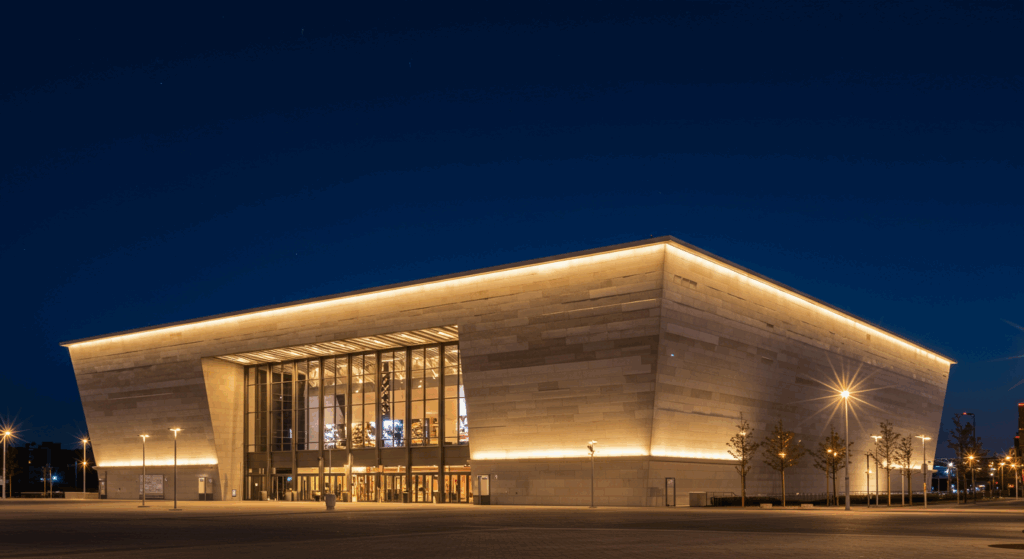
Competition for prime venues has intensified as consolidation continues to squeeze independent promoters. Having strong relationships and the right management tools can mean the difference between securing that perfect venue and watching it go to a competitor.
How Co-Promotion Changes Concert Budgeting
Co-promotion deals have become a game-changer in modern concert budgeting. Instead of one promoter shouldering all the financial risk, multiple partners split costs, responsibilities, and profits.
Risk sharing makes bigger shows possible. When two promoters combine resources, they can book larger venues, attract bigger artists, and handle more complex productions than either could manage alone. This partnership model has enabled many successful tours that would have been financially impossible for a single promoter.
Profit splits get complicated. Co-promoters typically divide revenues based on their investment level and responsibilities. One partner might handle venue costs and production while another manages marketing and ticketing. The challenge lies in accurately tracking these complex arrangements.
Market access expands. Local promoters bring deep community knowledge and established relationships, while larger partners provide financial resources and industry connections. This combination often results in better attendance and higher profits for everyone involved.
Managing co-promotion deals requires sophisticated tracking systems that can handle multiple revenue streams, shared expenses, and complex profit calculations. Savvy promoters are investing in live music management software specifically designed to handle these intricate financial relationships.
How Have Marketing and Ticketing Costs Evolved?
Marketing costs typically consume a reasonable percentage of ticket revenue, but the landscape has completely transformed over the past few years. Social media promotion, influencer partnerships, and targeted digital advertising have replaced traditional radio and print campaigns.
Digital marketing delivers better ROI. Platforms like Instagram, TikTok, and Facebook allow promoters to target specific demographics with precision. A well-crafted social media campaign can generate more buzz than expensive radio spots while costing a fraction of traditional advertising.
Ticketing fees are becoming controversial. Major ticketing platforms add fees to base ticket prices, creating sticker shock for consumers. Some promoters absorb these costs to maintain competitive pricing, while others pass them directly to buyers.
Mobile-first strategies dominate. With 85–95% of venues actively using social media as part of their marketing strategy, mobile integration has become essential. Fans discover shows, purchase tickets, and share experiences all from their smartphones.
The most successful promoters are those who can leverage concert promotion strategies that maximize digital reach while minimizing costs.
What Goes Into Concert Production and Technical Costs?
Production expenses account for a portion of ticket revenue, but these costs have exploded in recent years. Modern concerts feature sophisticated lighting rigs, massive video screens, complex sound systems, and elaborate stage designs that require specialized equipment and expertise.
Equipment rental dominates production budgets. Professional sound systems capable of filling large arenas require substantial daily rental fees. Lighting rigs with hundreds of moving fixtures and LED screens add significant costs. Video walls and projection systems for major tours represent another major expense category in rental fees.
Specialized technical expertise commands premium rates. Master electricians, audio engineers with decades of experience, and video technicians who can troubleshoot complex systems during live shows are in high demand. Their specialized skills justify higher day rates, especially when tours need professionals who can work flawlessly under pressure.
Transportation and logistics multiply costs exponentially. Moving truckloads of technical equipment between cities requires specialized transportation, experienced drivers, and careful coordination. Weather delays, traffic problems, or mechanical issues can quickly add unexpected expenses that weren’t factored into the original budget.
How Can Technology Help Control Concert Costs?
The complexity of modern concert budgeting demands sophisticated tools. Promoters who try to manage everything with spreadsheets and email threads quickly find themselves overwhelmed by the details.
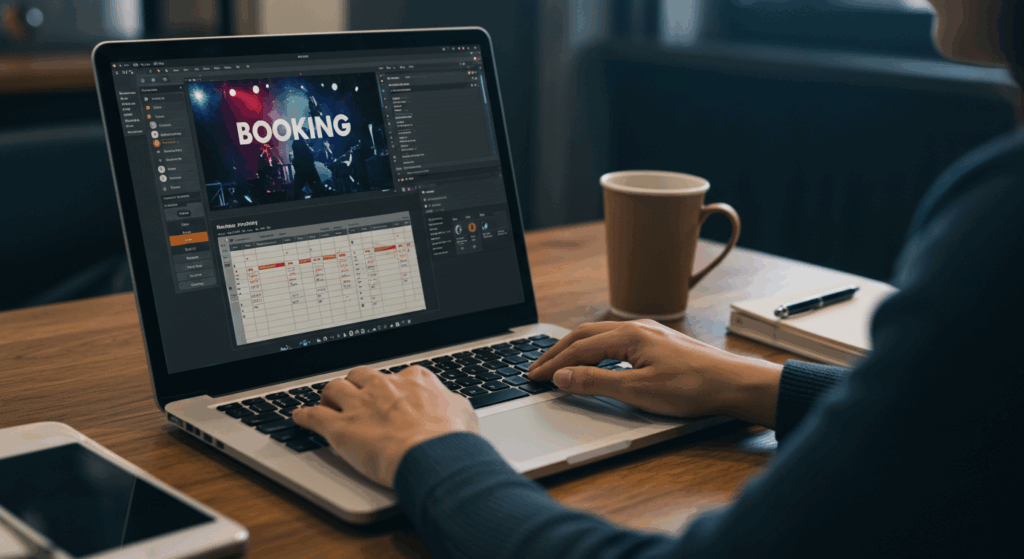
Integrated platforms save time and money. Instead of juggling separate systems for booking, budgeting, ticketing, and settlements, smart promoters are consolidating everything into comprehensive management platforms. This integration eliminates data entry errors, improves communication, and provides real-time financial visibility.
Automation reduces manual work. Modern systems can automatically update financials when tickets sell, track expenses against budgets, and generate detailed reports for stakeholders. This automation frees promoters to focus on creating amazing live music experiences.
Mobile access keeps everyone connected. The ability to check show status, approve expenses, and communicate with team members from anywhere has become essential. Tours don’t wait for anyone to get back to their desk.
Real-time financial tracking prevents surprises. The best management platforms provide instant visibility into budget performance, break-even points, and profit projections. This information allows promoters to make informed decisions quickly and avoid costly mistakes.
Frequently Asked Questions
How much do concert promoters typically make from each show? Concert promoters face financial risks with profit margins varying widely based on show success, unexpected costs, and market conditions. Even successful shows involve complex cost structures where multiple parties share revenue before promoters see profit.
Why are concert ticket prices so much higher than they used to be? Concert ticket prices have increased over the past five years due to rising production costs, higher artist fees as streaming reduces music revenue, expensive venue rentals, and dynamic pricing strategies that adjust costs based on demand.
What percentage of a concert ticket goes to the artist? While artists receive a significant portion of ticket revenue as their performance fee, recent analysis shows the actual profit artists take home is often just $8 from a $100 ticket after paying their entire touring operation, including band members, crew, equipment, transportation, and accommodations.
How do co-promotion deals affect concert budgeting? Co-promotion allows multiple promoters to share costs, risks, and profits on larger shows. This arrangement enables booking bigger artists and venues while reducing individual financial exposure, though it requires sophisticated tracking systems to manage shared revenues and expenses.
How Can Promoters Stay Profitable Despite Rising Costs?
With costs rising across every category, promoters need to be smarter about managing their concert budgets. The most successful operators have learned to leverage technology, build strong partnerships, and focus on efficiency at every level.
Whether you’re promoting intimate club shows or massive arena spectacles, the fundamentals remain the same: control your costs, maximize your revenue, and never let the details slip through the cracks. In an industry where a single mistake can wipe out months of profit, having professional-grade management tools is a necessity. Prism brings all your promotional activities together in one powerful platform, helping you manage costs more effectively while booking more shows. Get started with a free demo today.

Matt Ford is the founder and CEO of Prism.fm, an Austin-based software company revolutionizing live music event management. With a background in entrepreneurship and a degree from the University of Wisconsin-Madison School of Business, Ford combined his self-taught coding skills with firsthand experience as a concert promoter to address the inefficiencies he observed in the industry. In 2018, he launched Prism.fm, an all-in-one platform designed to streamline operations for venues, promoters, and agencies by replacing cumbersome spreadsheets with integrated tools for booking, financial tracking, and contract management. Under his leadership, Prism.fm has grown significantly, achieving $3 million in annual recurring revenue post-COVID and securing over $15 million in funding . Ford’s commitment to building user-centric solutions has positioned Prism.fm as a trusted partner for over 1,500 venues and promoters worldwide.

